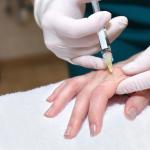Dermatovenerologist: what diseases he treats, what methods he uses
A dermatovenerologist is a doctor whose competence includes diagnosis, treatment, and prevention of skin and sexually transmitted diseases. Additionally, he deals with the relationship of these diseases with the general condition of the body.
The doctor sees not only those who lead a chaotic intimate life, but also solves problems with nails, skin rashes, and hair. The cosmetology industry of this specialization deals with the treatment of scars, scars, moles, warts, subcutaneous mesh, calluses, and other cosmetic defects.

What diseases does a dermatovenerologist treat?
Patients come to the specialist with various problems, mostly about the following diseases:
- psoriasis;
- vitiligo;
- seborrheic dermatitis;
- allergic dermatosis of various types - allergic, contact, eczema, neurodermatitis, urticaria, dermatitis;
- lichen planus and rosea;
- herpes, warts, HPV;
- moles, papillomas;
- acne, post-acne;
- gonorrhea;
- trichomoniasis;
- genital warts;
- genital herpes;
- urogenital candidiasis, chlamydia;
- molluscum contagiosum;
- types of nail and skin fungus (tinea versicolor, onychomycosis).
Considering the listed ailments, we can summarize that a dermatovenerologist is a doctor who deals with female and male genital organs, hair, skin, and nails.
More details about the dermatovenerologist in the video:
When should you consult a dermatovenerologist?
It is better to treat any disease at the very beginning, before other organs and systems are affected. Therefore, you need to make an appointment with a doctor if you have symptoms:
- the appearance of discharge from the genital organs, if there was none before, they are atypical;
- white plaque on the oral mucosa;
- itching of the anus, around it;
- rashes on any part of the body.
How do you know if a disease is sexually transmitted?
There are a number of signs that indicate you need to visit a doctor:
- when emptying the bladder, a burning sensation and pain appear;
- unhealthy discharge appears from the urethra and vagina (color, consistency, amount of discharge is atypical);
- frequent urge to urinate;
- pain in the groin area, testicles;
- disruption of the menstrual cycle schedule.
Some diseases do not manifest themselves for a long time. Therefore, doctors advise everyone who is sexually active to get tested regularly and undergo preventive examinations, even if nothing worries them. It’s better to play it safe than to face complications from gonorrhea, syphilis, etc.
Appointment with a dermatovenerologist
If you take another look at the number of diseases that a dermatovenerologist treats, you can guess what tools a doctor should have at hand. These are disposable gloves that the doctor throws away after each patient. If there are no gloves, this risks infecting the doctor and other patients.
The next thing the dermatovenerologist's office is equipped with is a couch, hidden from the eyes of strangers by a special screen. To examine female patients, you will need a gynecological chair. The doctor has instruments at hand with which he conducts an examination, takes scrapings and smears as necessary, and removes warts.
The dermatologist's office is equipped with bactericidal lamps to disinfect the room every couple of hours for 10 minutes. During this period, harmful microorganisms are destroyed, which ensures the sterility of the room and eliminates nosocomial infection. A dermatovenerologist works in a dispensary or in a specialized office.
- The examination begins with a visual assessment of the condition of the genital organs for changes and rashes.
- The skin is examined.
- The doctor takes materials for analysis and sends them to the laboratory.
Based on the results obtained, it is possible to clarify the diagnosis and prescribe adequate therapy.
An appointment with a doctor is anonymous, so patients do not have to worry about the confidentiality of information that will become available to the doctor.
Treatment of sexually transmitted diseases should be carried out together with a sexual partner.
If you ignore this rule, the disease will be transmitted in a circle from one partner to another, treatment will be ineffective, and it will cause complications for both.
Tests that need to be taken after visiting a dermatovenerologist;
- UAC, OAM;
- PCR diagnostics, examination of scrapings from the genital mucosa;
- allergy panel;
- microbiology. A culture of the flora is performed, which makes it possible to identify the resistance of the pathogen to antibacterial agents. This will help prescribe a targeted course of treatment against specific microorganisms. Such pinpoint targeting speeds up treatment, reduces the duration of the course, and reduces the effect of drugs on the body;
- dermatoscopy.
In addition to specialists for adults, there are also pediatric dermatovenerologists. They practice practically the same specialization as “adult” doctors, but only taking into account the characteristics of the child’s body. The modes of transmission of sexually transmitted diseases are not limited to sexual contact; there are diseases transmitted through household contact. This is why children sometimes suffer due to the fault of adults.

A dermatovenerologist diagnoses diseases of children, prescribes medications taking into account age, body weight, and characteristics of the child’s body.
Parents should be attentive to the baby’s health so that at the first sign of illness they immediately make an appointment with a doctor. Children who have previously had sexually transmitted diseases in their family are also at risk, especially if the child’s mother was sick during pregnancy.
A fragile child's body is susceptible to various infections, mutagenic manifestations, viruses, and due to low immunity, it is susceptible to dermatoses of various etiologies. The listed and other factors must be taken into account by the pediatrician. Non-invasive therapies are prescribed with great care to reduce stress on the body.
Children who have scabies, lichen, or dermatitis are often brought in for examination. Warts, acne, insect bites, and skin rashes due to internal factors are common. Provoking factors may be birth complications or undetected infections. When a child develops a rash, large areas of redness, it itches and torments, crusts, boils, acne appear - you need to visit a dermatovenerologist. The examination takes place in the presence of parents; they help the doctor draw up a picture of the disease, clearly answering the questions asked. If the child is large enough and is embarrassed to be examined in front of his parents, the doctor will offer a compromise option, based on medical recommendations in this regard.
The best treatment is prevention. To prevent the development of dermatovenerological pathologies in adults and children, you need to follow the recommendations of doctors. Most of them come down to proper nutrition, correction of daily routine and physical activity, room and body hygiene. Dermatovenerologists advise the following:
- remember and observe the rules of personal hygiene. This is especially true for genital hygiene. Cleaning them should not be excessive, but you should not leave dirt behind. Poor hygiene leads to diseases transmitted through household contact. Therefore, you can become infected without even being sexually active;
- those who are sexually active need to protect themselves from diseases using condoms. This is especially true for those who like to have promiscuous sex with strangers. Using condoms significantly reduces the risk of contracting STDs;
- use gloves when there is contact with household chemicals. Various chemical compounds that manufacturers add to cleaning fluids for various surfaces cause allergies. To reduce the risk of allergic dermatitis, you need to protect your hands with thick rubber gloves;
- lead a healthy lifestyle - quit smoking, do not abuse alcohol, do not touch drugs. This behavior will reduce the risk of a large number of diseases and maintain the immune system at its best.






